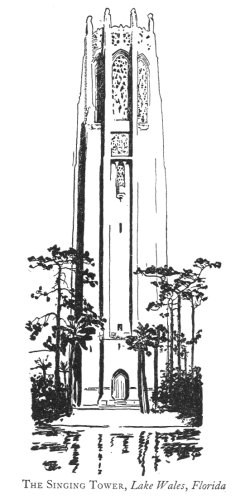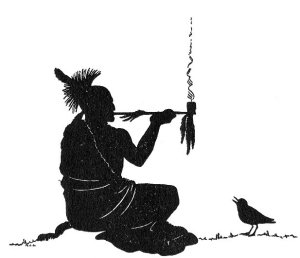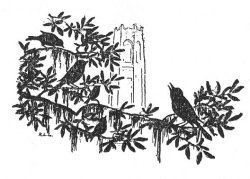The Tower That Sings |
A Native American Legend |

The golden plover, perched on a low bush near the old Pawnee Indian, Lone-Chief, began talking. Lone-Chief was looking across the Cimarron, a river of Oklahoma, near which the Pawnee tribe had been allowed, by the white men, to live. Lone-Chief looked across the river, puffed at his long pipe and listened. Lone-Chief listened.
"I have heard of it since I was last here, two hundred sunrises ago," said the golden plover. "During my flight to the North, it has happened. I have heard of a tower that sings."
The golden plover pruned his feathers, waiting for Lone-Chief to speak.
Lone-Chief puffed calmly at his pipe, but said nothing.
"There is a tower that sings," repeated the golden plover. "A tower there is that sings like all the birds."
Again the plover waited.
Lone-Chief, almost as motionless as the ground on which he was sitting, said nothing.
"The tower is in the land of flowers," went on the golden plover, "in the land of sunshine -- the land of birds. The tower sings each day, at sunset. This is a true thing. It was told to me by my brother, the golden plover of Lake-of-the-Hills. The tower is on an iron mountain. The tower is of stone, and sings."

Lone-Chief puffed several minutes, in silence, then slowly took the pipe from his mouth.
"My son," he said, in a calm tone, "the tower does not sing. The stone tower never sings. Hearken to me. In the beginning, Tirawa, the Great Spirit, appointed the stations of the stars. He bade Bright Star -- the evening star, the Mother of all things -- stand in the West. He bade Great Star, the morning star, stand in the East. He bade Star-That-Does-Not-Move -- star-chief of the skies -- stand in the North. He bade Spirit Star stand in the South, but to be seen, by men, only at a certain time in the year. He bade all the stars sing. He bade the stars sing at morn.
"Hearken to me, my son. There are things on earth that also sing. Hearken to my words, for I am one who has seen hundreds of moons. I am one to whom has come down, from my grandfather, knowledge of our tribe, knowledge of other tribes, knowledge of the earth on which all dwell. Ages ago, the people on the earth were many; so many that, if a count could be made of all the stars in the sky, all the feathers on birds, all the hairs and furs on animals, all the hairs of men's heads, the first people would be even more in number. Now, in that long-ago time, a tribe came, in its wanderings toward the sunrise, to a muddy river. They camped there. They rested there. The next day they came to another river. Two winters, two harvests, they lived there. They went, then, to the end of the river and heard a noise as of thunder. They went nearer to find whence the noise came. They found a red smoke and, beyond the smoke, a mountain. The mountain thundered, and on the mountain was a sound as of singing. The singing noise came from the great fire that blazed upward. Later, they found a red and yellow fire that came to them out of the North. This fire they mingled with fire from the mountain. This fire is used today and this, too, sometimes sings. Also, they found four herbs which sang, and, to this day, we use these singing herbs for healing.
"Hearken again, my son. For there are other things that sing. When the rain-god dips his great brush, made of feathers of the birds of the heavens, into the lakes of the skies and sprinkles the cornfields with refreshing rain, the rain-drops sing for gladness. When Tirawa sends his breath through the tree tops, the trees sing all the day or all the night. Once, too, when no winds blew, an elderberry tree, far to the west from here, made music. It sang a song of its own, both by day and by night. And Wek-wek it was who found the song-tree and took a piece of it home and planted it. Then other elderberry song-trees grew.
"Hearken further, my son. When I, a boy, fasted and made my tribal prayer (the clay on my head, my bow and arrow in my hand), the vision that came to me was a bird -- the song of Tonatzuli, sacred sun-bird. Thousands of paces have I gone since then, and Tonatzuli, heavenly singer, has always been ready to give me aid. All birds of earth that sing have, each, one note of Tonatzuli's song.
"Now this I tell you, my son. The brooks sing, the rivers sing, the summer breezes sing, the storm winds sing, children's voices and old men's voices sing. But stone sings not. The tower of stone sings not. The tower on the mountain of iron sings not."
Lone-Chief put his pipe into his mouth and smoked in silence, looking calmly at the golden plover. For a few moments longer, the plover remained on the bush. Then, with his clear "too-lee-lee lee-lu-wit," he flew down to the ground beside Lone-Chief.
"My father," began the golden plover, "I fly each year from farthest South to farthest North. I fly each year from farthest North to farthest South. When Winter-maker comes with his cold winds, fierce snows and frozen waters, southward I fly. When the first thunder in the spring warns us that winter is at an end and the time of planting is drawing near, northward I fly. I see the sky touching earth on every side. I see prairies, rivers, forests, mountains, oceans. All the birds I know. Ki-ki-ah, the mountain blue jay who plants acorns so freely that oak trees abound -- Ki-ki-ah is my friend. Olelle, that bird of my own shape, who lives in a cold spring deep down underneath the water, I sometimes see when he comes up in early morning and flies away. Wak-ko-lot-ko, the great, blue heron, I have talked with many a day. Beautiful Sialia, the bluebird, whose voice flows in joy, has taken short flights beside me. I have flown near the ancient-seeming pelican. I have followed O-shi-hi-yi, the mocking bird. I have watched the eagle, the All-flier, soaring along the path of the rainbow to the mountain-height. I have listened to the words of the dove. Only one bird I have not seen -- the giant cloud-bird, that Bird of Ages, the clapping of whose wings is the thunder, the glancing of whose eye is the lightning -- from whose white breast the snow of winter falls; but all other birds I know."
The golden plover paused a moment.
"My father," he added, "under the corn moon tonight I go on with my southward flight. I have rested here to tell you of the tower that sings like all the birds."
"Go, my son," then said Lone-Chief, slowly; "go -- and bring me word again. While you have been speaking, Tonatzuli, heavenly bird, bird of my vision, has told me I am to believe your report, whatever it may be. The pledge of bird is sacred. Bird can do more than man. Bird can float in the air and on the wind. Bird can soar toward heaven and the gods. Bird can fly over high mountains, when man must walk. Bird can dart like the lightning and travel like the sun. Bird can spurn the clouds -- can make wind by the spreading of his wings. His plumage is of the sunset -- his song the earliest music of the world. Go, my son; fly over goldenrod, fly over the golden corn and above the autumn trees of gold, until you reach the land of flowers and the tower of stone on the mountain of iron. But when the first corn is planted, return to me. Return at the time of the first planting."
The golden plover flew to the branch of a thick oak tree, where he perched for a few minutes, his spangled, golden and black feathers shimmering in the September sun. Soft trills rippled from his throat; then came a burst of melodious song
tee-lee-lee, tu-lee-lu-wit
and he was aloft in the air and away. The Pawnee Indian, smoking his long pipe, stared after the bird, as the golden plover flew along, now rising, now dipping, and, at last, drifted out of sight in the hazy southeast.
Beside Mountain Lake, in the Florida highlands, there stands a tower that has caught, in marble and stone, the flush of the dawn. The tower rises from the top of Iron Mountain, midway between the blue Gulf of Mexico and the Atlantic Ocean, a mountain held sacred by the Indians of old. Here, they reverenced the sun. Here, they performed their solemn Corn Dance. The region that encircles the tower is thronged by trees -- the palm, the pine, the laurel, magnolias, and live oaks. Here and there, amidst the green of the trees, gleam, in radiant color, lilies, orchids, wild plum, iris, dogwood, and acacia. Flaming azalias greet the sun. Fragrant jasmine sweetens the air. Bird notes sound everywhere. The pinnacles of the tower are adorned with representations of the crane, the pelican and the flamingo; and on the upper balconies are carved great eagles, with folded wings, and doves, carrying laurel and oak, in token of peace.
It was to this tower that the golden plover came, one evening, near the time of sunset. Among the many birds near him, on the tall, live oak on which he lit, was a chestnut-sided warbler.
"I am a stranger here," the golden plover said at once to the warbler. "I have a nesting-place, farther south, to which I have always gone by a different course. But, this autumn, I have flown out of my way to learn about this tower. My brother says it sings. Have you ever heard it sing?"
"It sings every day," said the warbler; "and sings like all the fairest winds that blow."
Then the golden plover turned to a mocking bird, above him, and asked, "Have you, too, heard the tower sing?"
"I live here all the time to hear its song," answered the mocking bird. "It sings like rippling lakes."
"And you, thrush?" inquired the golden plover. "Do you tell me the tower sings?"
"The tower sings as wondrously as the nightingale," replied the thrush.
"The nightingale?" said the golden plover, in surprised tone. "I do not know that bird."
"You will hear him in a moment," said the thrush, "for he always starts for us the evening song."
And as the delicate pink of the tower, reflected in the lake below, became more glowing in the sunset light, a deep, rich trill, even then, began, followed by a song that seemed to float down from heaven itself. All the birds, on shrub or tree or lake border, listened to the glorious song. The white ibis uttered once his "crook, croo, croo," and then was still. Stately, scarlet flamingoes perched on one leg and made no sound. The quail, the towhee, the pink curlew, the roseate spoon-bill, the cardinal, the little, laughing wren, and every bird, large or small, forgot his own song while listening to the nightingale's. Finally, the mocking bird took up some of the notes of the nightingale's song, and then all the birds who could sing, or chirp, or whistle, joined in a great chorus of joy.
When the singing ceased, a strange thing happened in the golden plover's hearing. The air was filled, all at once, with liquid, bell-like notes that seemed to come from the tower itself -- that pink-hued tower of marble and stone. Not a bird was singing, no water was rippling, no tree rustled. Yet a harmony of sound, that thrilled the whole being of the golden plover, sprang earthward, upward, outward, skyward. To the plover, it was as if earth and all its people, the sky and all its clouds and stars, had burst into one melodious, inimitable song -- a song such as Tonatzuli -- heard only in dreams -- might sing.
Winter-maker had gone to the Arctic region, and the first thunder of spring murmured in the south-land. The golden plover, winging swiftly in a northwesterly direction, came, in a straight line, to the Cimarron River. On a mild morning in early March, he greeted Lone-Chief who was sitting in front of his wigwam.
"Tee-lee-lee tu-lee-lu-wit," sang the bird. "My father, I have heard the tower that sings. It sings like all the birds of the world and like something beyond the birds."
Lone-Chief sat immovable. He sat as if unheeding. Many minutes passed. At length, the stolid Indian spoke.
"My son," he began, "there comes to me, now, a fragment of a mountain song made by a tribe not our own. My grand-father heard it from a Navajo Indian who fell into his hands. My grandfather sang it to me when I was young. This is the song."
Then the aged Indian chanted aloud, on the morning breeze:
Chief of all nations
(Thither go I!)
Living forever
(Thither go I!)
Blessings bestowing
(Thither go I!)
Calling me, "Son, my son!"
(Thither go I!)

"Golden plover," said Lone-Chief, to the bird whose fear-less eyes looked into his own, "Tonatzuli tells me your words speak truth. Were I a youth, I would start before yonder cloud moves a finger's breadth -- I would start this moment to the land of flowers to hear the tower that sings."
Sources And Further Reading |
Sacred Texts Tower Legends by Bertha Palmer Lane[1932]